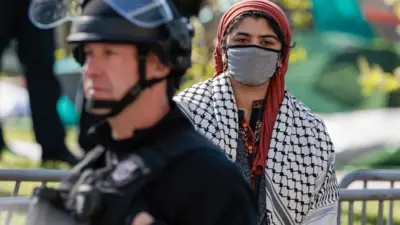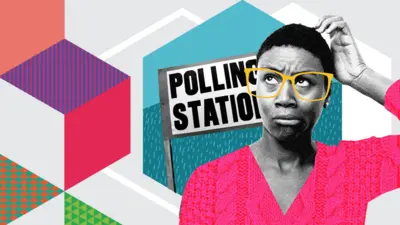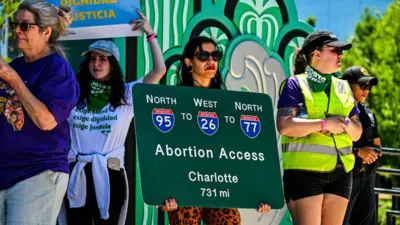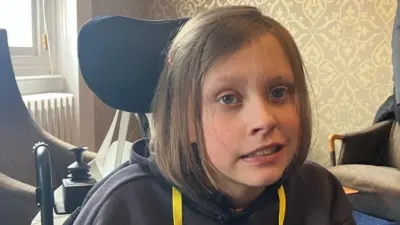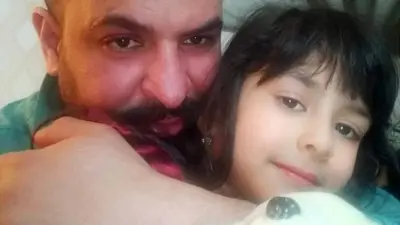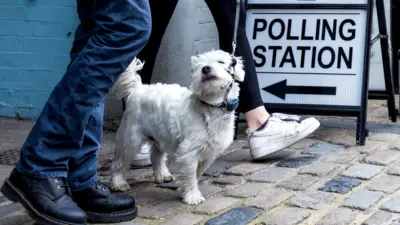We've updated our Privacy and Cookies Policy
We've made some important changes to our Privacy and Cookies Policy and we want you to know what this means for you and your data.
'Care needed' after getting Covid vaccine
Image source, Getty Images
People who have had Covid vaccines are being warned to still take care.
Vaccination has been shown to prevent severe infection, so even if people do catch the virus, they would be protected from getting seriously ill.
The call comes as an NHS nurse working for the Hywel Dda University Health Board area said she contracted Covid-19 while waiting for her second dose.
The health board said while the vaccine "reduces your chance of suffering", "no vaccine is 100% effective".
The Pfizer-BioNtech vaccine, which started being rolled out in the UK last month, offers up to 95% protection against Covid-19 after a second dose.
On Friday, the First Minister advised people receiving the vaccine to "continue to act in a precautionary way".
Mark Drakeford said those people should "recognise the new protection that they have" but "recognise as well that for many weeks, and for some months ahead, coronavirus is going to continue to be a feature of all our lives".
'False sense of security'
The hospital nurse, who works in the Hywel Dda University Health Board area in west Wales, said she felt "angry and heartbroken" about catching Covid at this stage.
The nurse, who has asked not to be identified, said she was initially relieved to be offered the chance of a vaccine and despite difficulties getting an appointment, she said she received her first dose of the Pfizer-BioNtech vaccine last month.
"It gave me peace of mind. It made me feel safer and that I was doing the right thing for my family... but it gives a false sense of security," she said.
The nurse said she was told it would take 10 days for the vaccine to offer some protection and reduce the risk of transmission.
However, three weeks after the jab, she said she began to feel unwell - with "quite severe symptoms" of a bad cough, high temperature and breathlessness - and said she was "shocked" when she tested positive for coronavirus.
She said her partner and one of her children also tested positive.
What do we know about the Pfizer-BioNtech vaccine?
- The first vaccination rollout - the Pfizer vaccine - began on 8 December last year.
- Two doses are needed and to date around a million people have already received the first dose.
- The original advice - in Wales and the rest of the UK - was that people would need the second dose of the Pfizer vaccine three weeks after the first injection.
- But that changed last month to 12 weeks between doses on the advice of the UK's chief medical officers.
- The World Health Organisation does not recommend following the UK's decision, but has "made a provision for countries in exceptional circumstances of vaccine supply constraints and epidemiological settings" to delay the second dose for a few weeks to maximise the number of people getting a first dose.
- Pfizer said it has tested the vaccine's efficacy only when the two doses were given up to 21 days apart.
The British Medical Association Cymru Wales has previously expressed concern about the length of time between doses.
Doctors' union, BMA Cymru Wales, said there was a lack of evidence to support waiting 12 weeks for a second vaccine dose.
Chair Dr David Bailey said: "Our families don't choose to be exposed to a much higher dose of Covid, so we feel it's right that we should be protecting health workers and their families."
Hywel Dda health board said it had already vaccinated more than 10,000 high-risk people, including frontline NHS staff.
Deputy Chief Executive Dr Philip Kloer, said: "It is always distressing to hear about staff contracting the virus. Whilst the vaccine reduces your chance of suffering from Covid-19, no vaccine is 100% effective.
"There is particular risk that you may have contracted Covid-19 immediately prior to having the vaccine without knowing it, or that you may contract it in the week or two following vaccination as your body builds up protection.
"We have communicated the UK policy and assurances on second doses to our staff and assured them they will receive their second dose within 12 weeks of the first."
He added: "Working within the NHS at the moment is very challenging and we acknowledge how difficult this is.
"Staff have worked tirelessly and made many sacrifices on behalf of caring for our communities and we are extremely grateful. We have put in place additional support and counselling and psychological support services."
Top Stories
Features & Analysis
Most read
Content is not available

